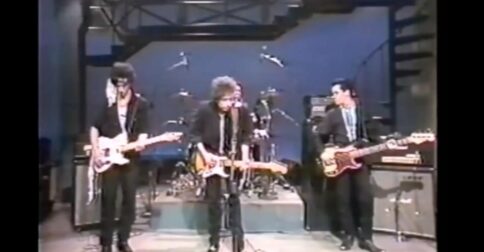Bob Dylan Goes Punk on Late Night with David Letterman, Playing “Jokerman” with the Latino Punk Band, the Plugz (1984)

Listen to Bob Dylan’s studio albums all you like; you don’t know his music until you hear the live versions. That, at least, is the conclusion at which I’ve arrived after spending the better part of the past year listening through Dylan’s studio discography. This is not to put him into the mold of the Grateful Dead, whose studio albums come a distant second in importance to their vast body of live recordings. It was surely the songs preserved on the likes of Highway 61 Revisited, Blood on the Tracks, and Love and Theft, after all, that won Dylan the Nobel Prize. But in a sense he’s never stopped writing these same songs, often subjecting them to brazen stylistic and lyrical changes when he launches into them onstage.
This self-reinterpretation occasionally produces what Dylan’s fans consider a new definitive version. Perhaps the most agreed-upon example is “Jokerman,” the opener to his 1983 album Infidels (and the basis for one of his earliest MTV music videos), which he performed the following year on the still-new Late Night with David Letterman.
As Vulture’s Matthew Giles puts it, Letterman was fast becoming “a comedy sensation, bringing a new level of sarcasm, irony, and Bud Melman-centric humor to a late-night format still reliant on the smooth unflappability of Johnny Carson.” Dylan had been going in the other direction, “having frustrated his audience with the musically slick, lyrically hectoring series of evangelical Christian albums that he’d released in the late 70s and early 80s.”
By 1984, “Dave was far more of a counterculture hero than Bob.” But Dylan had been surreptitiously preparing for his next musical transformation: many were the nights he would “leave his Malibu home and slip into shows by the likes of L.A. punk stalwarts X, or check out the Santa Monica Civic Center when the Clash came to town.” For accompaniment on the Letterman gig he brought drummer J.J. Holiday, as well as Charlie Quintana and bassist Tony Marsico of the LA punk band the Plugz, with whom he’d been spent the previous few months jamming. It isn’t until they take Letterman’s stage that Dylan tells the band what to open with: bluesman Sonny Boy Williamson’s “Don’t Start Me Talking.”
You can see Dylan’s entire three-song set in the video above, which also includes sound-check footage. After “Don’t Start Me Talking” come two songs from Infidels: “License to Kill” and a rendition of “Jokerman” that turns the original’s reggae into stripped-down, hard-driving rock. The stylistic change seems to infuse the 42-year-old Dylan with a new sense of musical vitality. As for the song itself, its lyrics — cryptic even by Dylan’s standards — take on new meanings when charged by the young band’s energy. But even in this highly contemporary musical context, Dylan keeps it “classic” by bringing out the harmonica for a final solo, though not without some confusion as to which key he needed. If anything, that mix-up makes the song even more punk — or maybe post-punk, possibly new wave, but in any case thoroughly Dylan.
Related content:
Bob Dylan & The Grateful Dead Rehearse Together in Summer 1987: Hear 74 Tracks
How Bob Dylan Created a Musical & Literary World All His Own: Four Video Essays
Based in Seoul, Colin Marshall writes and broadcasts on cities, language, and culture. His projects include the Substack newsletter Books on Cities, the book The Stateless City: a Walk through 21st-Century Los Angeles and the video series The City in Cinema. Follow him on Twitter at @colinmarshall or on Facebook.
from Open Culture https://ift.tt/qVaoOiZ
via Ilumina


Comments
Post a Comment